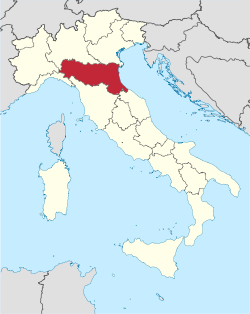Emilia Romagna
| Emilia-Romagna | |||
|---|---|---|---|
| Region of Italy | |||
|
|||
 |
|||
| Country | Italy | ||
| Capital | Bologna | ||
| Government | |||
| • President | Stefano Bonaccini (PD) | ||
| Area | |||
| • Total | 22,446 km2 (8,666 sq mi) | ||
| Population (2010-11-30) | |||
| • Total | 6,429,766 | ||
| • Density | 290/km2 (740/sq mi) | ||
| Time zone | CET (UTC+1) | ||
| • Summer (DST) | CEST (UTC+2) | ||
| GDP/ Nominal | €144.140 billion (2008) | ||
| GDP per capita | €31,900 (2008) | ||
| NUTS Region | ITD | ||
| Website | http://www.regione.emilia-romagna.it | ||
Emilia-Romagna (pronounced [eˈmiːlja roˈmaɲɲa], Emilian: Emélia-Rumâgna, Romagnol: Emélia-Rumâgna) is an administrative Region of Northeast Italy, comprising the historical regions of Emilia and Romagna. Its capital is Bologna. It has an area of 22,446 km2 (8,666 sq mi), and about 4.4 million inhabitants.
Emilia-Romagna is one of the wealthiest and most developed regions in Europe, with the third highest GDP per capita in Italy. Bologna, its capital, has one of Italy's highest quality of life indices and advanced social services. Emilia-Romagna is also a cultural and tourist centre, being the home of the University of Bologna, the oldest university in the world, containing Romanesque and Renaissance cities (such as Modena, Parma and Ferrara), being a centre for food and automobile production (home of automotive companies such as Ferrari, Lamborghini, Maserati, Pagani, De Tomaso and Ducati) and having popular coastal resorts such as Cervia, Cesenatico, Rimini and Riccione.
...
Wikipedia


